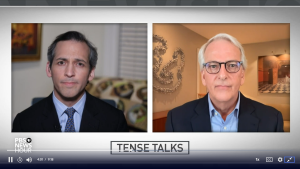US Public Support for Defending Ukraine May Not Be Solid

Recent data shows Americans prefer diplomatic options first, but there is also record support for defending Ukraine.
The United States and NATO held unsuccessful meetings with Russian officials this week in response to Russia’s buildup of about 100,000 troops on the border with Ukraine. Russian President Putin requested that NATO roll back its military presence in Eastern Europe and prohibit additional countries (for example, Ukraine or Georgia) from joining the alliance in the future. US and NATO officials rebuffed these demands, leaving negotiations at a stalemate.
Earlier in the week, Russia’s lead negotiator, Deputy Foreign Minister Sergei A. Ryabkov, said that Moscow had no plans to invade Ukraine, but opaquely warned the US and NATO countries that if Moscow’s demands were unmet, there would be serious consequences to the “security of the whole European continent.” In their most recent statements, representatives of both the American and Russian delegations indicated that the two sides are at an impasse, with Russia unwilling to recall its troops from the border and the United States and its allies rejecting key components of the draft agreements proposed by Russia. While Russian negotiators have said they will wait for a formal written response to their demands from the West before taking any action, military escalation is looking more and more likely.
Council Survey Finds Record High Percentages Support Defending Ukraine
The July 2021 Chicago Council Survey, conducted before Russia amassed its troops outside Ukraine’s borders, found that a record high 50 percent of Americans said they would support “the use of US troops if Russia were to invade the rest of Ukraine,” up from 30 percent in 2014, just after Russia’s annexation of Crimea. This willingness to use force to defend Ukrainian borders seems driven more by distrust of Russia than a desire to protect a vulnerable country: a combined majority of Americans consider Russia a US adversary (39%) or a rival (26%), but only a third think that protecting weaker nations against foreign aggression is a very important US foreign policy goal (32%).
…But Support Could Be Soft
A YouGov-Charles Koch Institute survey, conducted in December 2021 after the recent increase in Russian troops at the border found that “if Ukraine is invaded again by Russia,” a plurality of Americans (48%) would oppose “going to war with Russia to protect Ukraine’s sovereignty.” Only 27 percent would favor going to war, and 24 percent indicate they don’t know.
These differences in support levels between the Council and YouGov-CKI survey could signal that American support for military action to defend Ukraine is soft, given that it appears that many Americans would choose a “don’t know” response to this question if it is available to them. (Historically, the Council survey has not offered overt “don’t know” response options, although respondents are free to skip any question which would register a no-answer coded response.)
The variance in levels of support in the two surveys may also reflect differences in timing (July vs. December), actual question wording (the Council survey asks about “use of US troops if Russia invades the rest of Ukraine,” and the YouGov-CKI poll asks about “going to war to protect Ukraine’s sovereignty,”) and order effects (the YouGov-CKI poll question follows several previous questions about burden sharing and defense spending).
Americans Prefer Diplomacy, Sanctions to Defuse Situation
After Monday’s eight-hour talks concluded, the lead American negotiator, Deputy Secretary of State Wendy Sherman, stated: “We must give diplomacy and dialogue the time and space required to make progress on such complex issues.”
Americans prefer a diplomatic solution to the conflict with Russia over military escalation. Another more muscular option is for the United States to provide weapons to Ukraine to help Kyiv defend itself in the event of a Russian invasion. But Americans are generally against this idea, with 56 percent opposing and only 41 percent in favor.
A December 7-9 Morning Consult poll also found that more Americans preferred the United States rely on diplomacy (34%) and sanctions (22%) than direct military support (17%, along with 27% don’t know) “to reduce the likelihood of a Russian invasion of Ukraine.” These results are in line with Council findings from a May 25-June 17, 2015 survey conducted in the wake of the Russian invasion of Crimea. At that time, increasing diplomatic efforts with Russia (64%) and increasing economic and diplomatic sanctions on Russia (60%) were significantly more popular than more aggressive responses such as sending arms and military supplies to the Ukrainian government (40%) and training Ukrainian military troops (52%).
These data offer an idea of American opinion as a snapshot in time and demonstrate how opinion can vary based on the live context, question wording, and question order. Now that Russia and NATO countries are in a stalemate, failing to reach a compromise, public attitudes depend on what Russia does next, how NATO allies decide to respond, and how the respective governments explain their positions to their own citizens.


Related Content
 Public Opinion
Public Opinion
On the heels of Ukrainian president Zelenskyy’s meeting with US President Biden, the 2021 Chicago Council Survey finds that a record 50 percent of Americans favor the use of US troops if Russia were to invade the rest of Ukraine.
 Defense and Security
Defense and Security
A joint task force outlines some key principles and judgments in managing the United States' relationships with Russia, Ukraine, and Eurasia.
 Global Politics
Global Politics
“The only way to prevent that military threat from coming to fruition is for the alliance to be unified,” Council President Ivo Daalder tells PBS Newshour.
